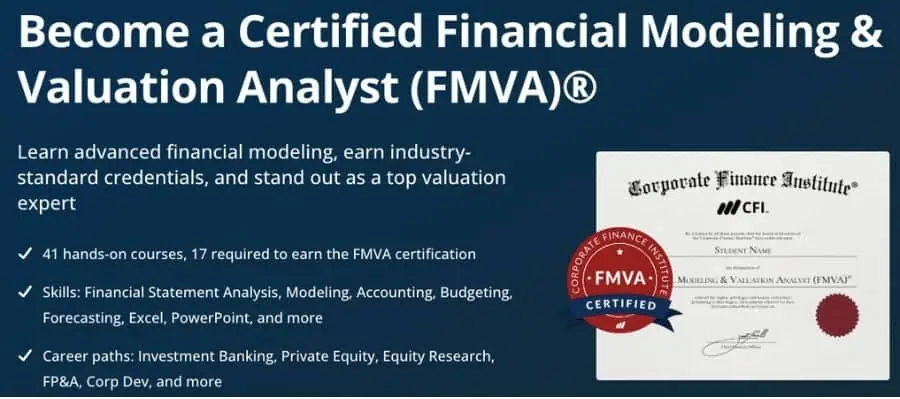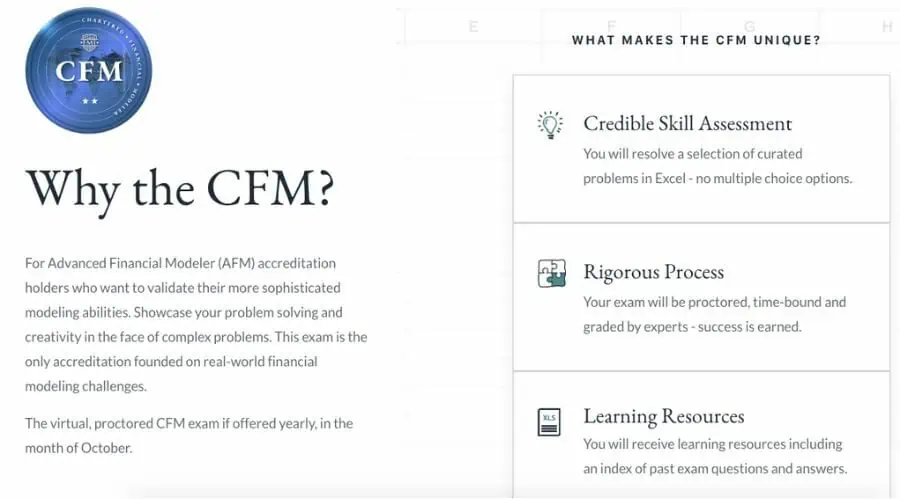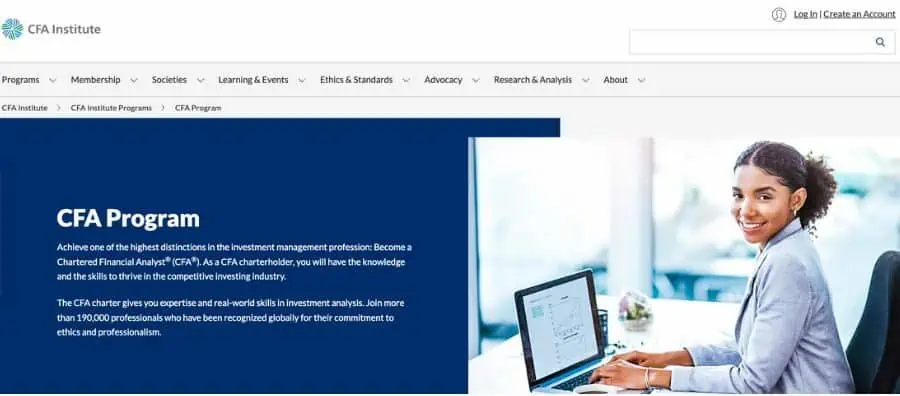The 6 Best FP&A Certifications To Level Up Your Career
Attention finance professionals! Are you eager to boost your career in Financial Planning and Analysis (FP&A)? Well, you’re in the right place. I understand that the finance world is ever-changing, and staying ahead requires constant learning and skill enhancement.
Interest piqued? Great! FP&A certifications enhance your knowledge and skills and significantly improve your marketability. It’s a powerful credential that makes you stand out in the competitive finance industry.
Want to learn more? My comprehensive guide will lead you through the best FP&A certifications available, detailing what each certification entails and the potential career paths they can unlock.
Don’t just dream about career advancement. Act now! Use this guide to decide which FP&A certification suits your career goals and skill set. Your journey to becoming an FP&A superstar starts here!
The Best FP&A Certifications
Here is my carefully curated list of the best FP&A Certifications:
1) Certified Financial Modeling & Valuation Analyst (FMVA)

The Certified Financial Modeling & Valuation Analyst (FMVA) is a premier professional certification program offered by the Corporate Finance Institute (CFI). It’s globally recognized and ideal for those who aspire to elevate their careers in the field of financial analysis, investment banking, or equity research. The FMVA certification focuses on practical finance applications and is respected by employers across the financial industry.
Skills Covered
The FMVA certification covers a broad spectrum of crucial financial skills. This includes but is not limited to, long-range planning, business valuation, strategic planning, Excel functionality, budgeting, forecasting, and corporate decision-making. The program hones these skills to refine your financial analytical capabilities, providing you a substantial edge in today’s aggressive job market.
Who Is It Best For
The FMVA certification is particularly advantageous for professionals already in finance, investment banking, equity research, or related fields looking to escalate their credentials. A corporate financial planning analyst would find a lot of value in this certification. A strong quantitative background and a drive to improve your analysis skills would be key to leveraging this certification.
Pricing
The FMVA certification program offers two pricing models. The self-study program costs $497, which grants you access to all the certification resources but doesn’t include any personal support. If you opt for the Full Immersion Bundle at $847, you’ll receive personal support, an achievement badge, and priority responses to your queries.
2) Certified Corporate FP&A Professional (FPAC)

The Certified Corporate FP&A Professional (FPAC) is a globally recognized certification designed for professionals seeking to advance their careers in corporate financial planning and analysis. The Association for Financial Professionals (AFP) offers this prestigious certification and is respected by employers worldwide.
Skills Covered
The FPAC certification covers a wide range of essential financial planning and analysis skills. This includes strategic planning, budgeting, forecasting, financial modeling, data interpretation, and decision-making support. The program focuses on practical, applicable skills directly relevant to the FP&A field.
Who Is It Best For
The FPAC certification is designed for working professionals in the field of finance and corporate planning. It suits those with a few years of experience in financial analysis, budgeting, or similar roles and are looking to expand their knowledge base, advance their career, and gain recognition in the industry.
Pricing
The pricing for the FPAC certification varies, depending on whether you’re an AFP member or not. As of writing, the price for AFP members is $695, while non-members must pay $995. Remember that these prices include both the application fee and the examination fee.
3) Chartered Financial Modeler (CFM)

The Chartered Financial Modeler (CFM) course is another prestigious certification in the finance world. As the name suggests, the program primarily focuses on providing comprehensive training in financial modeling, a fundamental skill in today’s finance industry. This certification helps you master the art of building robust financial models from scratch, interpret the results, and make informed business decisions.
Skills Covered
The CFM certification curriculum covers various skills essential for financial modeling. The course encompasses everything from financial budgeting basics to creating complex financial models. The core competencies honed during the certification include financial statement analysis, Excel modeling skills, investment appraisal, detailed operating models, capital budgeting, and corporate decision-making. The course also covers advanced topics such as mergers and acquisitions (M&A) modeling, project finance modeling, and leveraged buyout (LBO) modeling.
Who Is It Best For
The CFM certification is best suited for professionals seeking to elevate their careers in finance, particularly in roles that require strong financial modeling skills, such as investment banking, equity research, and corporate finance. It is also ideal for beginners with strong quantitative backgrounds who aspire to enter these fields. The ability to build, analyze, and interpret financial models is an invaluable skill employers across the financial industry value.
Pricing
The Chartered Financial Modeler Program offers the self paced course at $599, which includes all the essential resources required for self-study. But, for an enhanced learning experience and dedicated support, a Premium package is priced at $799. This package offers advantages such as personal mentor support, priority responses, and a digital badge to showcase your certification accomplishment. Both options represent a worthy investment, providing a solid foundation for a flourishing career in finance.
4) Chartered Financial Analyst (CFA)

The Chartered Financial Analyst (CFA) certification offered by the CFA Institute is a globally recognized and highly respected certification in the field of finance. This rigorous program is designed to provide a strong foundation of advanced investment analysis and real-world portfolio management skills.
Skills Covered
The CFA certification empowers candidates with a comprehensive understanding of capital markets and technical finance. The program is segmented into three levels, each building on the one before it. It covers ethics, quantitative methods, economics, analyzing financial statements, corporate finance, equities, fixed income, derivatives, and portfolio management. Through this course, candidates also gain proficiency in using financial analysis software and tools.
Who Is It Best For
The CFA certification is best suited for individuals looking to establish a career in investment management, financial analysis, portfolio management, or risk management. It is particularly beneficial for budding investment professionals and people transitioning into the finance sector from another industry. The certification can enhance one’s reputation, networking capabilities, and job prospects in the financial industry.
Pricing
The one-time enrollment fee for the CFA Program is $450. The standard registration fee for each level of the exam is approximately $950. However, early bird registration offers lower fees, priced around $700. Although the overall cost of obtaining a CFA certification can be quite substantial, the investment can yield significant returns in terms of career advancement and increased earning potential.
5) Certificate Of Corporate Finance (CCF)
The Certificate of Corporate Finance (CCF) is a prestigious credential designed specifically for finance professionals seeking to broaden their understanding of corporate financial management. This certification delves into the intricate dynamics of financial decision-making within a corporate setting, offering a 360-degree view of the financial landscape.
Skills Covered
The CCF certification covers a wide gamut of advanced corporate finance principles. You’ll delve into management reporting and management accounting principles while learning to interpret complex financial data. In addition, you’ll dive into core financial accounting and financial reporting topics like the income statement, balance sheet, and cash flow statement. The course also delves into the nuances of capital budgeting, financial presentations, and working capital management. By completing the course, candidates are expected to exhibit a solid understanding of the principles and applications of corporate finance.
Who Is It Best For
The CCF certification is ideal for professionals already in the finance sector or those looking to transition into it, especially in roles related to corporate finance. This might include financial analysts, corporate strategy managers, CFOs, or entrepreneurs who want a deeper understanding of finance for their business operations. It’s also a great fit for recent business, economics, or related graduates seeking to fortify their financial acumen.
Pricing
The cost to enroll in the certified corporate financial planning program varies based on the learning provider, but on average, you can expect to pay around $1,000 for this certification.
6) Financial Planning and Analysis Modeling Certification (FPAMC)
The Financial Planning and Analysis Modeling Certification (FPAMC) is a comprehensive certification designed to equip professionals with the necessary skills to excel in FP&A roles. This certification imparts knowledge of various financial modeling tools and techniques, providing a comprehensive understanding of how budgeting, forecasting, and analysis can drive strategic business decisions.
Skills Covered
The FPAMC certification covers various skills integral to finance teams. Key areas include understanding key financial concepts, mastering data analysis and interpretation, budgeting and forecasting, and using financial models for decision-making. It also provides in-depth knowledge of Excel and other financial modeling software, crucial tools for today’s finance professionals.
Who Is It Best For
The FPAMC certification is ideal for those aspiring to or already in FP&A roles. This may include Budget Analysts, Financial Analysts, Finance Managers, Business Analysts, or those in corporate finance roles. In addition, it’s a beneficial certification for entrepreneurs or business owners who want to better understand financial planning to lead their businesses more effectively.
Pricing
The cost of the FPAMC certification varies depending on the provider, but you should expect to pay an average of around $1,200.
What Are The Benefits Of An FP&A Certification
Having an FP&A certification like FPAC under your belt can significantly enhance your career prospects.

For starters, it solidifies your credibility in the industry. It signals to employers that you have undergone rigorous training and have acquired a profound understanding of financial planning and analysis. This is a highly valued expertise in today’s volatile business environment, where strategic decision-making is crucial for survival and success.
An FP&A certification can be helpful if you want to transition to FP&A from another field. For accounting professionals, this certification can help you gain the technical skills and knowledge to make a career switch.
Also, an FP&A certification ensures an edge in today’s competitive job market. FPAC credential holders, along with other certifications, are in high demand! It sets you apart from other professionals who may have similar work experience but lack specific certification. This unique distinction can make all the difference in being selected for lucrative job opportunities or promotions.
It’s an investment in yourself that can yield substantial returns in the form of career advancement and higher income potential.
Lastly, the pursuit of an FP&A certification also translates into personal growth. The preparation process exposes you to new concepts and techniques, broadening your perspective and sharpening your strategic and critical thinking skills. It encourages continuous learning and development, preparing you to tackle complex financial challenges confidently and competently.
How To Choose An FP&A Certification
Choosing the right FP&A certification can be quite a task, considering the variety and depth each one offers. But don’t fret; I am here to help you navigate this maze. Let’s get started.
Firstly, consider your career aspirations and the skills you wish to acquire. Different certifications emphasize different skills.
For instance, the CFM heavily emphasizes modeling and analysis skills, while the CFA focuses more on investment management. On the other hand, the CCF is geared towards corporate strategy, while the FPAC blends a bit of all. So, carefully analyze each certification’s curriculum and learning objectives and pick the one that aligns best with your career goals.
Next, take into account the time commitment and cost. Certifications are an investment of both time and money. Some, like FPAC, may require more extensive study and have higher fees than others. Consider your budget and the time you can commit to studying before deciding.
Lastly, consider the reputation of the certification and how it is recognized in the industry. Talk to professionals in the field or join online forums to get insights on the perceived value of different certifications. Which ones do employers prefer? Which ones are held in higher regard by your peers? This information can guide you in making an informed choice.
Remember, the right FP&A certification can be a game-changer for your career, so choose wisely!
What Is The Best Way To Learn FP&A
The journey to mastering Financial Planning & Analysis (FP&A) is exciting, brimming with numerous learning avenues. The key to navigating this journey effectively is to adopt a multi-faceted learning approach that balances theoretical knowledge with practical insights. Let’s explore how.
Investing in a solid foundation of financial theory is crucial. This can be acquired through formal education, such as a finance or accounting degree, or professional certifications like the FPAC.
These courses provide a comprehensive understanding of financial concepts, principles, and methodologies, equipping you with the tools to analyze financial data and develop strategic recommendations. Remember, the goal is not just to learn but to understand and apply the knowledge in real-world scenarios.
Aside from structured learning, hands-on experience is an invaluable way to learn FP&A. The core role of FP&A is serving as strategic business partners to the operation. The only way to learn business partnering is by doing it!
Start by volunteering for finance-related projects in your current role or consider internships or an entry-level finance position. Nothing beats the learning curve of being immersed in the day-to-day operations of FP&A. You will have the opportunity to put theoretical knowledge to practice, learn how to navigate financial systems, interpret financial data, and contribute to financial strategies.
Lastly, never underestimate the power of continuous learning. The finance landscape is dynamic and ever-changing, with new trends, tools, and methodologies emerging regularly. Staying updated with industry news, attending workshops and webinars, networking with like-minded professionals, and joining finance forums can keep you at the forefront of the FP&A field. Remember, learning FP&A is a marathon, not a sprint. So, embrace the journey and enjoy growing into a proficient FP&A professional.
Quick Recap
FP&A certification, like FPAC, is important for those looking to break into the field or catapult their career to new heights.
To get certified, there are a few options – take formal education such as a degree or professional certifications, gain hands-on experience, or stay on top of industry trends by joining networking events and workshops. With dedication and hard work, you can start your FP&A career with confidence and trust in your abilities. You can become a proficient FP&A professional with the right knowledge and practice.
Good luck!
Have any questions? Are there other topics you would like us to cover? Leave a comment below and let us know! Remember to subscribe to our Newsletter to receive exclusive financial news in your inbox.

